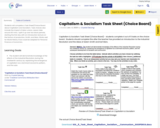
Conditional Remix & Share Permitted
CC BY-NC
Students will complete a Task Sheet/Choice Board about Capitalism and Socialism. Task choices also include the impact of labor unions. Lesson take around 90 mins. I split it up over two block periods, starting the first day with an introduction lecture on the factors of production, Smith, and Marx. Works well for World History II but could be adapted for Personal Finance or Economics.
- Subject:
- History/Social Sciences
- World History
- Material Type:
- Activity/Lab
- Assessment
- Homework/Assignment
- Date Added:
- 01/02/2020